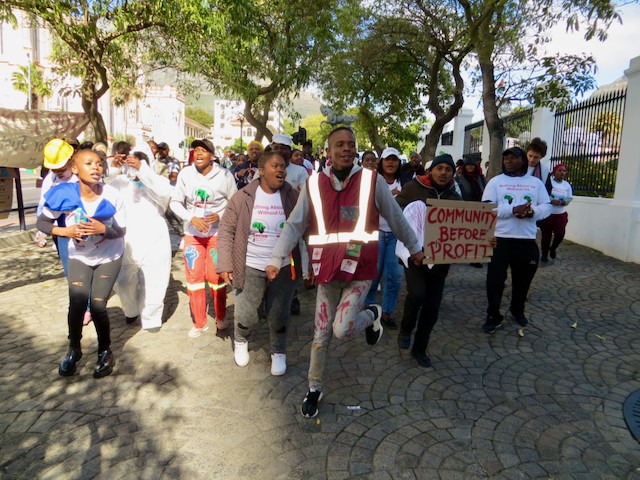Mining affected communities protest outside Parliament
Activists demand mines develop and help the communities that host them
Activists from communities affected by mining in Limpopo, Free State, Mpumalanga, Gauteng, KwaZulu-Natal and North West provinces picketed outside Parliament on Tuesday. Photo: Vincent Lali
Under the banner of Mining Affected Communities United, about 100 activists picketed, sang and toyi-toyied outside Parliament on Tuesday, while they waited for officials to receive their memorandum. But no official came.
The protesters had come from Limpopo, Free State, Mpumalanga, Gauteng, KwaZulu-Natal and North West provinces.
They want the Department of Mineral Resources to see to it that mining communities are meaningfully consulted, and that prior and informed consent is received for mining operations, said Meshack Mbangula, national co-ordinator of Mining Affected Communities United in Action (MACUA).
In a press release, MACUA and Women Affected by Mining United in Action (WAMUA) said, “In 2020, MACUA and WAMUA delivered 50,000 signatures of affected community members to Parliament … Throughout 2021, we have sent email after email, memorandum after memorandum”. But there has been no response from Parliament, the statement said.
“Mines must have continuous five-year plans to develop communities hosting them. The plans can include building clinics and schools,” said Mbangula.
Instead, he said, mining operations saw people “forcefully removed” and suffering disease caused by air pollution and water contamination.
“We need a permanent platform where we can continuously give reports to the Department of Mineral Resources about these problems and where we continuously hold mining companies accountable for mining related problems,” he said.
MACUA general secretary Tokelo Mahlakoane said mining had stopped communities farming in Moroke Sekutlong and other areas in Limpopo.
“Before mining companies came, we used to farm and sell our veggies for a living, but we no longer do so because mining companies removed us from our land,” she said.
“We no longer use river water because it’s contaminated. I buy water from borehole owners for about R600 monthly.”
Mahlokoane said they also wanted mining companies to employ an equal number of women.
Members of the Alternative Information and Development Center, the Social Justice Coalition, Intlungu yaseMatyotyombeni Movement, the South African Federation of Trade Unions, Tshisimani Centre for Activist Education, and the Western Cape Pickers Forum also joined the protest.
Mbangula said he had communicated with the chair of the parliamentary portfolio committee for mineral resources and energy, Sahlulele Luzipo, and they would meet on Friday to discuss MACUA’s grievances and demands.
Support independent journalism
Donate using Payfast

Don't miss out on the latest news
We respect your privacy, and promise we won't spam you.
© 2022 GroundUp. This article is licensed under a Creative Commons Attribution-NoDerivatives 4.0 International License.
You may republish this article, so long as you credit the authors and GroundUp, and do not change the text. Please include a link back to the original article.
We put an invisible pixel in the article so that we can count traffic to republishers. All analytics tools are solely on our servers. We do not give our logs to any third party. Logs are deleted after two weeks. We do not use any IP address identifying information except to count regional traffic. We are solely interested in counting hits, not tracking users. If you republish, please do not delete the invisible pixel.

